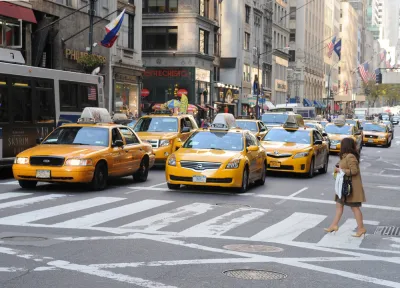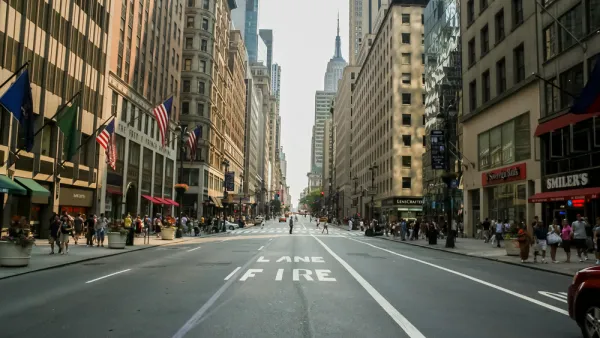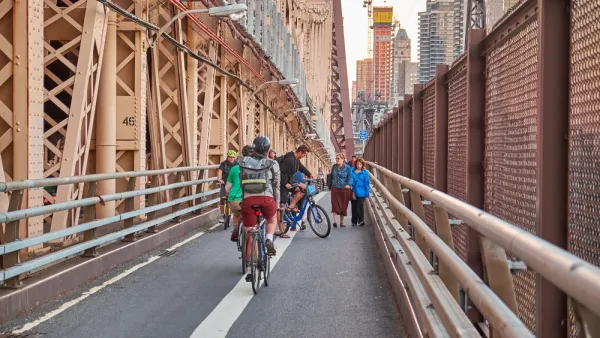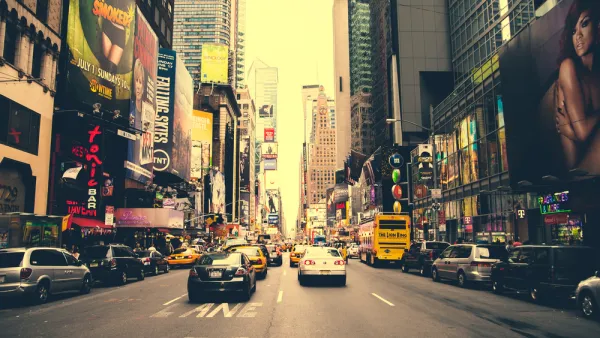Motorists and truckers would pay tolls to drive south of 60th Street in Manhattan while passengers in taxis and ride-hailing vehicles would pay a surcharge under a plan released Friday by the Fix NYC panel convened by Gov. Cuomo in October.

New York Times reporters Winnie Hu and James Dwyer reviewed a draft of the plan released Thursday by the Fix NYC panel, formed after Governor Andrew Cuomo (D) declared a state of emergency in the subways last June.
The panel had a two-fold purpose: reduce congestion in Manhattan's Central Business District and provide needed funding for the city's ailing subways and bus lines.
In announcing his support last summer for congestion pricing, Gov. Andrew Cuomo said the Metropolitan Transportation Authority, the region’s umbrella transit agency, needs a new, reliable source of funds. Depending on how the prices are structured, the task force estimated that up to $1.5 billion could become available annually.
According to the Fix NYC Advisory Panel Report [pdf], prepared by HNTB Corporation, passenger vehicles would pay a toll of $11.52 to drive south of 60th Street, charged once per day, Monday through Friday, between the hours of 6am to 8pm.
Trucks would pay $25.34, and taxis and ride-hailing vehicles could see surcharges of $2 to $5 per ride within Manhattan's Central Business District, report Hu and Dwyer.
The report says that the fees on taxis and for-hire vehicles could be put in place within a year, followed by trucks and then cars in 2020. None of those fees should be charged, the [Fix NYC] task force said, until repairs are made to the public transit system.
Bridge tolls?
What may be a major shortcoming of the plan is that it doesn't call for tolls on the New York City-owned bridges over the East and Harlem rivers, an integral part of the Move NY congestion pricing plan released in 2013. In fact, it is likely that changes made to the Fix NYC plan by Gov. Cuomo, as is his right, would lower tolls on bridges and tunnels owned by the Metropolitan Transportation Authority, report Hu and Vivian Wang for The New York Times on Jan. 19.
The only tolling would come from overhead toll gantries lining 60th Street southbound intersections in Manhattan, like former Mayor Michael Bloomberg's plan that died on the state Assembly floor in April 2008 without even getting a vote due to overwhelming opposition.
Hopefully the bridge toll reductions would only come after the MTA is receiving revenue from the 60th Street tolls. In a feature New York Times article last November on how city and state leaders have diverted funds from M.T.A, Emma G. Fitzsimmons, et.al., write:
In 2013, the M.T.A. was made to send $5 million to an affiliate agency, the Triborough Bridge and Tunnel Authority, to cover the cost of reducing tolls.
Silver lining of deteriorating subway system?
The crisis in the transit system may also make it easier for Mr. Cuomo to sell the pricing plan to the legislature. When Mr. Bloomberg made his pitch a decade ago, the transit system was in far better shape. In fact, the Bloomberg plan was intended to address surging ridership and anticipated the budget pressures that led to maintenance cuts.
Most of the plan would require the approval of the state legislature, which is expected to receive [the plan] Friday.
Mayoral opposition?
Unlike the 2008 plan advanced by former Mayor Bloomberg the New York City Council, Mayor Bill de Blasio has opposed congestion pricing, favoring a millionaires' tax to finance transit improvements, arguing that "congestion pricing hurts the middle class and poor who live outside Manhattan and drive into it."
The report dismissed those claims, saying only 4 percent of residents of other boroughs commute to jobs in Manhattan in a vehicle, or approximately 118,000 residents. Of those, it said, more than half were higher income individuals, and fewer than 5,000 of them would qualify as working poor.
However, de Blasio appeared "cautiously open to the plan," report Hu and Wang on Friday.
“This plan certainly shows improvement over previous plans we’ve seen,” Mr. de Blasio said during a radio appearance on WNYC, calling it “definitely a step in the right direction.”
However, de Blasio emphasized to listeners that this was a plan advanced by the state, not the city, and he continues to prefer a progressive income tax over a transportation user fee to fund transit improvements.
Political battle ahead in Albany
"Mr. Cuomo, a Democrat who is up for re-election this year, almost certainly faces a legislative battle over congestion pricing, especially with lawmakers from the boroughs outside Manhattan who fear that a congestion plan would hurt their constituents who drive because they have limited access to subways and buses," add Hu and Wang.
Opposition will be bipartisan. Paying more to drive generally transcends party lines.
Hat tip to Mark Boshnack.
FULL STORY: Driving a Car in Manhattan Could Cost $11.52 Under Congestion Plan

Analysis: Cybertruck Fatality Rate Far Exceeds That of Ford Pinto
The Tesla Cybertruck was recalled seven times last year.

National Parks Layoffs Will Cause Communities to Lose Billions
Thousands of essential park workers were laid off this week, just before the busy spring break season.

Retro-silient?: America’s First “Eco-burb,” The Woodlands Turns 50
A master-planned community north of Houston offers lessons on green infrastructure and resilient design, but falls short of its founder’s lofty affordability and walkability goals.

Test News Post 1
This is a summary

Analysis: Cybertruck Fatality Rate Far Exceeds That of Ford Pinto
The Tesla Cybertruck was recalled seven times last year.

Test News Headline 46
Test for the image on the front page.
Urban Design for Planners 1: Software Tools
This six-course series explores essential urban design concepts using open source software and equips planners with the tools they need to participate fully in the urban design process.
Planning for Universal Design
Learn the tools for implementing Universal Design in planning regulations.
EMC Planning Group, Inc.
Planetizen
Planetizen
Mpact (formerly Rail~Volution)
Great Falls Development Authority, Inc.
HUDs Office of Policy Development and Research
NYU Wagner Graduate School of Public Service




























